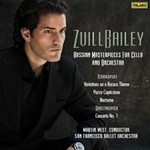
Variations on a Rocco Theme / Pezzo Capriccio (with Shostakovich-Cello Concerto No 1)
 $32.00
Out of Stock
$32.00
Out of Stock6+ weeks add to cart
TCHAIKOVSKY
Variations on a Rocco Theme / Pezzo Capriccio (with Shostakovich-Cello Concerto No 1)
Zuill Bailey (Cello) / San Francisco Ballet Orchestra / Martin West
[ Telarc Records / CD ]
Release Date: Sunday 1 March 2009
This item is currently out of stock. It may take 6 or more weeks to obtain from when you place your order as this is a specialist product.
Zuill Bailey, the dynamic and exhilarating American cellist, makes his Telarc debut with the release of Russian Masterpieces for Cello. The recording includes Tchaikovsky's Variations on a Rococo Theme and the Nocturne in D Minor Op. 19 No. 4, and Shostakovich's Cello Concerto No. 1 in E-Flat Major, Op. 107.
The voice of the cello is uniquely suited to the qualities of passion and melancholy that makes Russian music so provocative to listeners "In an indirect way, Tchaikovsky helps fill the void that cellists feel since Mozart never featured the cello in any of his compositions," Bailey said.
Pyotr Ilyich Tchaikovsky, (1840-1893) idolized Wolfgang Amadeus Mozart, and that fascination with Mozart's century and the decorative grace of Rococo Art inspired this work. The Rococo Variations were intended for the German-born cellist Wilhelm Fitzenhagen, a professor at the Moscow Conservatory. When Tchaikovsky left Russia for a lengthy stay in Western Europe, he gave Fitzenhagen a free hand in composition, which resulted in significant structural alterations to the piece. The cellist premiered his version of the Rococo Variations at a Moscow concert conducted by Nikolai Rubinstein in 1877. Tchaikovsky was displeased with the alterations, but later said, "The devil take it. Let it stay as it is." The Fitzenhagen score is heard in Bailey's rendition, and is considered an effective presentation of Tchaikovsky's material.
The Nocturne is a cello and orchestra arrangement of Tchaikovsky's solo-piano Nocturne, Op. 19, No. 4. The composer reconceived the Nocturne for cello by transposing it from C-sharp minor to D minor. The resulting melodies are typical of Tchaikovsky's wistfulness.
The music of Dmitri Shostakovich (1906-1975) was driven from Soviet concert stages after being denounced by Stalin functionaries for his "bourgeois formalism." Bailey explains: "Shostakovich's Cello Concerto No.1 in E-Flat Major, Op. 107 was written a few years after Stalin's death, it expresses his new found musical freedom in the relief of the heavy Stalinist restrictions. The work also reinforced Shostakovich's unofficial role as a national spokesman, as it contains his own aggression toward the government, his lament for lost colleagues, his sense of solitude and his enduring national pride."
In 1959, Shostakovich wrote the concerto for the distinguished cellist Mstislav Rostropovich, who had frequently performed Shostakovich's Sonata for Cello and Piano with the composer at the piano. His Concerto No. 1 in E-flat major for Cello and Orchestra, Op. 107 was premiered in Leningrad with the Leningrad Philharmonic and Rostropovich. When Shostakovich gave his only public performance as a conductor in 1962, the Concerto appeared on the program.
Zuill Bailey's rare combination of compelling artistry, technical finesse and engaging personality have secured his place as one of the most sought-after cellists today. Bailey performs regularly with long-time duo partner, pianist Awadagin Pratt, as well as with pianist Simone Dinnerstein. He is also a member of the acclaimed Perlman-Schmidt-Bailey Trio, which also includes pianist Navah Perlman and violinist Giora Schmidt.
As a solo artist, he has performed with the symphony orchestras of Chicago, Dallas, Ft. Worth, Louisville, Milwaukee, Minnesota, San Francisco, Toronto and Utah. He has also made numerous international appearances, including celebrated performances with the Moscow Chamber Orchestra during its 50th anniversary tour of Russia, as well as concerts in the Dominican Republic, France, Israel, Hong Kong, Jordan, Mexico, Peru and the United Kingdom.
Zuill Bailey has also appeared on the HBO hit show Oz. In the show's first season (1998), he portrayed the "murderous cellist" Eugene Dobbins, who was sentenced to prison for killing a violinist (with his cello) in a jealous rage. Zuill's character subsequently died in a prison riot. He returned for the show's final season in 2003, playing Bach from the grave/prison cell in a segment called, "Sonata da Oz."
Bailey performs on a 1693 Matteo Gofriller Cello, formerly owned by Mischa Schneider of the Budapest String Quartet. In addition to his extensive touring engagements, he is the Artistic Director of El Paso Pro Musica and Professor of Cello at the University of Texas at El Paso. Bailey endorses Thomastik Infeld Strings with Connolly and Company Music.
Tracks:
Tchaikovsky:
Variations on a Rococo Theme for Cello and Orchestra, Op. 33
Pezzo capriccioso in B minor for Cello and Orchestra, Op. 62
Nocturne in D minor for Cello and Small Orchestra, Op. 19, No. 4
Shostakovich:
Concerto No. 1 in E-flat major for Cello and Orchstra, Op. 107


